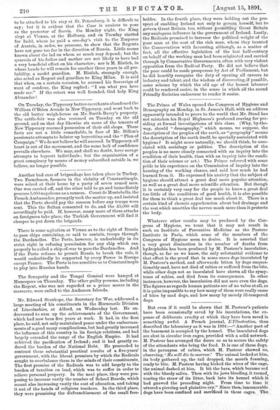Mr. Edward Stanhope, the Secretary for War, addressed a large
meeting of his constituents in the Horncastle Division of Lincolnshire, at Alford, on Wednesday last. He en- deavoured to sum up the achievements of the Government, which had now been five years at work. It had, in the first place, he said, not only maintained peace under the embarrass- ments of a good many complications, but had greatly increased the influence of this country in its foreign relations, and had largely extended the range of the English Empire. It had achieved the pacification of Ireland; and it had greatly re- duced the burden of the National Debt. He proceeded to contrast these substantial practical results of a five-years' government, with the liberal promises by which the Radicals sought to overbalance them in the minds of their constituents. The first promise of the Radicals was to add largely to the burden of taxation on land, which was to suffer in order to relieve personal property. In the next place, they were pro- posing to increase vastly the number of School Boards, which meant also increasing vastly the cost of education, and taking it out of the hands of religious teachers. In the third place, they were promising the disfranchisement of the small free- holder. In the fourth place, they were holding out the pro- spect of enabling Ireland not only-to govern herself, but to, govern Great Britain too, without permitting Great Britain any analogous influence in the government of Ireland'. Lastly, the Radicals promised to increase the political weight of the poor man at the cost of the rich man, whom they taunted the Conservatives with favouring, although, as a matter of fact, all the effective legislation of the last half-century on behalf of the working man had been originated and carried through by Conservative Governments, often with very violent opposition from the Radiaal Party. He did not believe that the poor could be made prosperous by Act of Parliament, but he did heartily recognise the duty of opening all careers to. industry and talent, and the wisdom of discovering, if possible,. some scheme by which the old age of the honest labourer- could be rendered easier, in the sense in which all the sound Friendly Societies endeavour to render it easier.


































 Previous page
Previous page